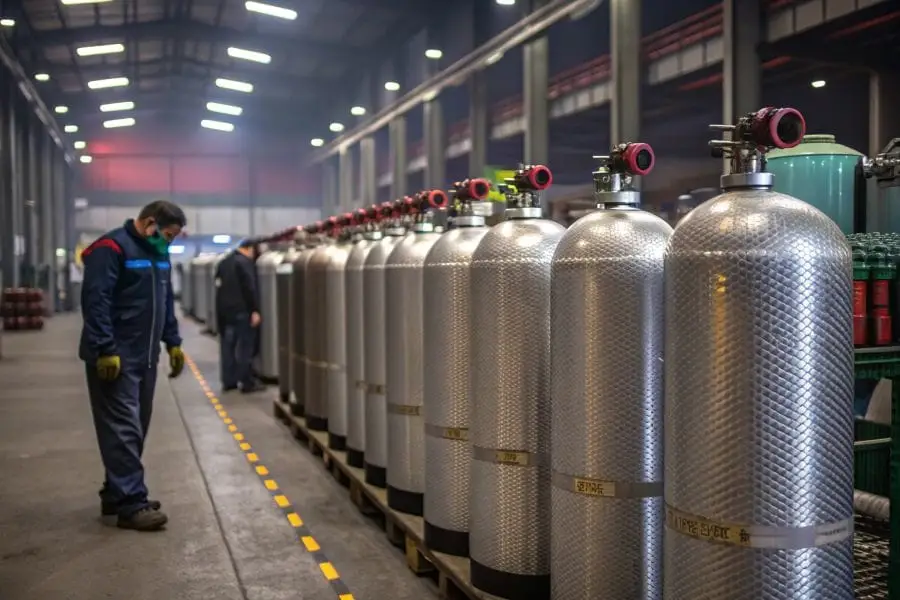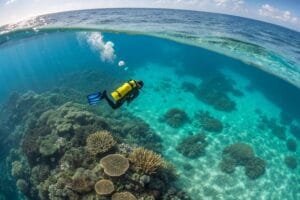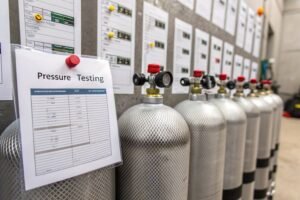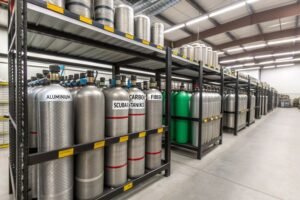Choosing a supplier is a huge risk. The wrong one costs you time, money, and reputation. Let’s walk through how to find a partner you can trust.
To properly vet a SCUBA tank manufacturer, you must look beyond the price tag. The best partners are verified by demanding technical certifications (DOT, CE), confirming their production capacity and lead times, assessing their communication responsiveness, and ensuring they can support your business's long-term growth.
I've been in this industry for a long time. I've spoken with countless buyers, like David, a wholesaler from Australia. He once told me his biggest frustration wasn't price, but suppliers who over-promised and under-delivered. It created inventory nightmares and damaged his credibility with his own customers. That's why we believe a partnership starts with honesty and proven capability. It's the reason we built our company, Snowrain, from the ground up to be the kind of factory we'd want to buy from ourselves. This guide is built on those real-world experiences. It's not just about buying tanks; it's about building a supply chain you don't have to worry about. Let’s start with the most basic question.
Why does the choice of cylinder manufacturer matter more than the brand name on the tank?
It's easy to trust a familiar brand name. But do you know who actually made their cylinders? Your quality and safety depend on a factory you may have never heard of.
The manufacturer matters more because they control everything critical: raw materials, engineering standards, quality control, and safety certifications. The brand is often just a logo; the manufacturer is responsible for the tank's actual integrity and performance. Your reputation rests on their work.
Based on my experience, many of the most famous scuba gear companies in the world don't operate their own cylinder factories. They are brand experts and marketers. They design and sell a wide range of gear, but for something as specialized as a high-pressure gas cylinder, they rely on an Original Equipment Manufacturer (OEM) like us. This is a very common and effective business model, but it means that as a buyer, you have to look one layer deeper. The quality you are selling to your customers is not determined by the marketing team of the brand, but by the engineers and technicians on the factory floor.
The Hidden Factory Behind the Brand
When you partner with a brand, you are implicitly trusting their choice of manufacturer. But for a serious wholesaler, that's a big risk. The factory is where the critical decisions are made. They select the grade of aluminum or carbon fiber. They calibrate the machinery that forms the cylinders. They run the tests that ensure the tanks can withstand immense pressure safely, over and over again. If there is a shortcut taken, it's taken in the factory, long before the brand's sticker is applied. A good manufacturer has a culture of quality that protects both the brand and, more importantly, the end-user.
Who Owns the Responsibility?
Ultimately, if a tank fails, the investigation will lead back to the manufacturing process. As a business owner, your liability and your reputation are directly linked to the integrity of that process. By vetting the manufacturer directly, you are taking control of your own quality assurance. You are moving from being a passive customer of a brand to an active partner in the supply chain. This is the key difference between simply reselling a product and building a resilient business.
| Focus Area | Big Brand Name | Cylinder Manufacturer |
|---|---|---|
| Primary Goal | Marketing & Distribution | Engineering & Production |
| Core Expertise | Brand Building | Material Science & Safety Testing |
| Key Metrics | Sales & Market Share | Defect Rates & Certification Compliance |
| Responsibility | Customer Experience | Product Integrity & Safety |
What technical specifications and certifications should you demand from a SCUBA tank supplier?
Every supplier says they have "top quality." But these claims are meaningless without proof. Selling an uncertified tank can lead to huge legal problems and safety risks for your customers.
Always demand current certifications for your specific sales market, such as DOT for the USA or Pi-mark (CE) for Europe. You should also request material traceability reports and data from quality control tests like hydrostatic, burst, and cycle testing.
When a potential partner contacts us, this is one of the first things we discuss. A few years ago, a potential buyer from the United States, Juan, approached us. He was developing hydrogen storage systems and needed a reliable supply of carbon fiber cylinders. His previous supplier had sold him a batch of cylinders that couldn't be legally used in the US because they lacked the proper DOT certification. The entire project was delayed. This is a costly mistake that comes from not asking for the right documents upfront. A professional manufacturer will have these documents ready and will be happy to share them. It's a sign that they understand global trade and take regulations seriously.
Decoding the Alphabet Soup of Certifications
Certifications are non-negotiable. They are issued by official bodies and confirm that a cylinder meets the required safety and manufacturing standards for a specific country or region. Selling a cylinder without the right stamp is illegal and unsafe.
- DOT (Department of Transportation): This is required for cylinders sold or used in the United States.
- TC (Transport Canada): This is the Canadian equivalent of the DOT certification.
- CE / Pi-Mark (Conformité Européenne): The Pi-mark is used for transportable pressure equipment sold within the European Union. It signifies compliance with their strict safety directives.
You must tell your supplier exactly where you plan to sell the tanks so they can provide the correctly certified products.
Beyond the Certificate: Material and Testing
A certificate is the result of a rigorous process. You should also ask about that process. For our aluminum cylinders, we use high-strength aluminum alloy 6061-T6, and we can provide material analysis reports to prove it. Every single tank we produce undergoes a hydrostatic pressure test. We also perform batch tests, including burst tests where we intentionally pressurize a tank until it fails, to ensure it fails safely and at a pressure far beyond its service pressure. Asking a potential supplier about these tests shows them you are a knowledgeable buyer.
| Certification | Primary Region | What It Means |
|---|---|---|
| DOT | USA | Meets US Department of Transportation safety standards. |
| TC | Canada | Meets Transport Canada safety standards. |
| Pi-Mark (CE) | European Union | Compliant with the Transportable Pressure Equipment Directive. |
| ISO | International | Follows international standards for manufacturing processes (e.g., ISO 9001 for quality management). |
How can you assess a manufacturer's production capacity and guarantee reliable lead times?
You placed a huge order based on a promised lead time. Now, that date has passed, and you have empty shelves. This common problem can be avoided by checking their capacity first.
To verify production capacity, ask for the number of active production lines, their average monthly output, and their current production schedule. A transparent manufacturer can provide this. A small trial order is also an excellent real-world test of their promised lead times.
We know that for a wholesaler, stock is everything. You can't sell what you don't have. That’s why we invested in building five separate production lines. It gives us flexibility and redundancy. If one line is down for maintenance or is dedicated to a large carbon fiber cylinder order for a client like Juan, we still have four other lines to produce the aluminum dive tanks needed by a client like David. This capacity is the foundation of our promise of "Fast Delivery." We don't just say it; we've built the infrastructure to make it happen. Empty promises from a supplier can break your business, so you have to look for physical proof of their claims.
The Difference Between a Factory and a Trading Company
This is a critical distinction to make. A true factory, like Snowrain, controls the entire production process. We own the machines and manage the schedule. A trading company is a middleman. They take your order and then place it with a factory. This adds a layer of communication delay and uncertainty. The trader may not have accurate information about the factory's real capacity or potential delays. Whenever possible, deal directly with the factory. You get better information, more control, and often a better price because you are not paying a middleman's commission.
Questions to Ask About Production
When you are vetting a new supplier, be direct. Ask them specific questions that are hard to fake. A good manufacturer will appreciate your diligence and have the answers ready.
- "How many production lines do you operate for this specific type of cylinder?"
- "What is your average monthly output in units?"
- "What is your current lead time for an order of 500 units?"
- "Can you share photos or arrange a virtual video tour of your facility?"
A supplier who hesitates or gives vague answers to these questions might not have the capacity they claim.
What are the green flags of a supplier with efficient, responsive communication?
Nothing is more frustrating than silence from a supplier. Slow or unclear communication wastes your time and shows a lack of respect for your business. Let's identify the good signs.
Key green flags are prompt replies (within 24 business hours), clear answers that directly address your questions, and a dedicated contact person who understands your needs. Proactive updates on your order without you having to ask are the mark of a true partner.
This is maybe the most common complaint I hear from buyers. Their previous supplier was just "hard to talk to." For serious, busy people like Juan and David, communication is not about being chatty; it's about efficiency. They send an email with three specific technical questions. They expect an email back that answers those three questions clearly and accurately. It sounds simple, but many suppliers fail this basic test. We train our sales team to be consultants, not just order-takers. Their job is to provide the information you need to make a good decision, and to do it quickly. It's a matter of respect for your time.
The 24-Hour Reply Rule
In global trade, time zones are a reality. But a professional supplier should be able to respond to any inquiry within one business day. This should be your minimum expectation. A fast reply shows that they are organized, they are monitoring their inbox, and they value your inquiry. If it takes them a week to reply to an initial sales email, imagine how long it will take them to respond when you have an urgent problem with an order in progress.
Clarity is King
A fast reply that is useless is still useless. A "Green Flag" response is both fast and clear.
- It answers all the questions you asked.
- It uses simple, direct language. No confusing jargon.
- If they need more information from you to answer, they ask specific questions.
- They provide documentation or data to support their claims.
This kind of clear communication builds trust. It shows that you are dealing with a professional organization that pays attention to detail.
| Communication Red Flags 🚩 | Communication Green Flags ✅ |
|---|---|
| Replies take 3+ days | Replies within 24 hours |
| Answers are vague or ignore questions | Answers are clear and address each point |
| No single point of contact | A dedicated, knowledgeable representative |
| You always have to ask for updates | They provide proactive order updates |
| "We'll check and get back to you" (and don't) | "Here is the data you requested." |
Beyond price, how does a true manufacturing partner support your business's growth?
The lowest price per unit looks great on paper. But what happens when you need custom branding or technical support? A cheap supplier often disappears after the sale is made.
A true partner invests in your success. They support you with reliable OEM/private labeling services to build your brand, offer flexibility for custom orders, provide technical support, and give honest advice on logistics to help your business operate smoothly and grow.
We see our success as being tied directly to our clients' success. If a wholesaler like David can build his brand in Australia using our high-quality cylinders, he will order more. If a developer like Juan can successfully create his new hydrogen system using our custom carbon fiber tanks, he will become a long-term partner. This is why we focus on partnership, not just transactions. A one-time sale at a rock-bottom price is not a sustainable business model. A long-term relationship built on trust and mutual benefit is. The support we provide after you sign the contract is just as important as the product itself.
Your Brand, Our Cylinders (OEM Services)
For a wholesaler or distributor, building your own brand is the key to long-term profitability. You want customers to ask for "David's Dive Tanks," not just any generic tank. This is where Original Equipment Manufacturer (OEM) services are so valuable. A good manufacturing partner makes it easy for you to put your brand, your logo, and your color scheme on the cylinders. We work with you to get the look just right, so the product that arrives at your warehouse is ready to sell and builds your brand equity, not someone else's. This is a service that a cheap, low-effort supplier will often not provide well.
A Partner in Problem-Solving
Your market is always changing. Your customers might start asking for a new size of tank, a different valve configuration, or a unique color. A simple supplier will say, "Sorry, we only make these three models." A true partner will say, "That's interesting. Let's talk about the technical requirements and the order volume. Maybe we can develop that for you." This flexibility is essential for growth. We are a factory with our own engineers. We have the capability to be adaptable and work with you to solve problems and meet new market demands. That is the kind of support that helps you out-compete your rivals.
Are you ready to find a SCUBA cylinder manufacturer who takes your business seriously?
Finding a great manufacturer seems like a lot of work. You have to ask all these questions and vet every detail. The process itself can feel like a full-time job.
Yes, you are. The right partner will welcome your detailed questions. They will be eager to provide certifications, be transparent about their production, and communicate clearly. A manufacturer confident in their quality will make the vetting process easy, not difficult.
The entire point of this guide is to empower you. You now have a checklist of what to look for and what to ask. This process is your filter. It will quickly separate the professional, high-quality manufacturers from the rest. A supplier who gets annoyed by your detailed questions is a supplier you should not be doing business with. A company that is proud of its factory, its processes, and its team will be excited to show them to you. They will see your diligence not as a hassle, but as the beginning of a serious, long-term business relationship.
We Built Our Business to Be the Partner You're Looking For
We created Snowrain and built our factory with these exact principles in mind. We knew the frustrations that buyers faced, so we designed our business to be the solution.
- Capacity: We have five production lines to ensure reliable lead times.
- Quality: We hold DOT, CE, and other key certifications because we believe in verifiable, world-class standards.
- Communication: Our team is trained to respond promptly and clearly because we respect your time.
- Partnership: We offer full OEM services to help you build your brand.
Let's Start a Conversation
We are ready to answer every question in this guide. If you are a buyer for a large company, a wholesaler, a gas refilling station, or a medical equipment distributor, we understand your needs. Send an email to me, Snow, at snow@cylindify.com. I will personally ensure you get clear answers, the documentation you need, and a transparent look at how we can help your business. Let's build a supply chain you can trust.
Conclusion
Choosing the right manufacturer isn't about price; it's about partnership. Verify quality, capacity, and communication to build a supply chain you can truly rely on for years to come.







